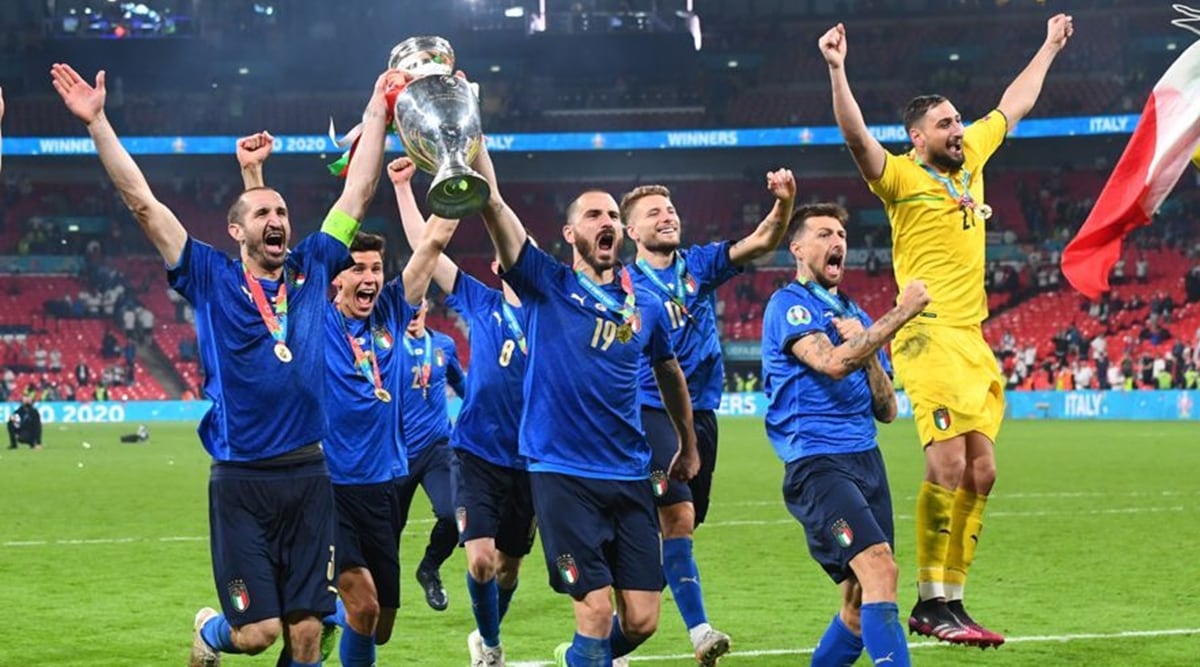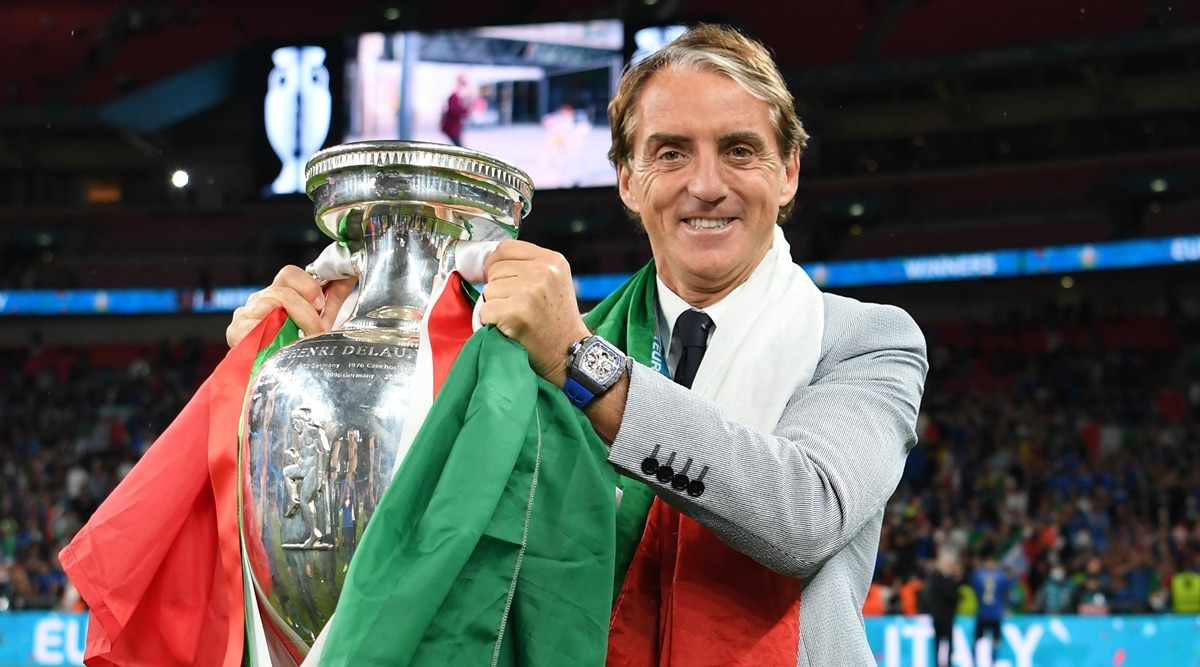 Italy players celebrate with the Euro 2020 trophy after winning the final. (Twitter/Euro 2020)
Italy players celebrate with the Euro 2020 trophy after winning the final. (Twitter/Euro 2020) Even months before Italy’s European Championship triumph, their dapper manager Roberto Mancini knew his side would conquer the continent. In an interview with fashion magazine GQ, he detailed his summer plans: “The objective is to spend the summer in Portonovo signing autographs as a champion manager.” It’s a beach in the Italian province of Ancona near Jesi, the town Mancini grew up in and where he spends time, swapping the Armani for a beach t-shirt and shorts, or often going topless, flaunting his still chiselled physique.
He said this partly in jest, but Mancini has always been firm in his assertions and views.
But after his idyllic vacation, once the new season of Calcio rings in next month, Mancini would drive back to the Centro Tecnico Federale di Coverciano, the technical headquarters of Italian football in bustling Rome, known simply as Coverciano, plotting and planning the next project for the European champions with his trusted aide Gianluca Vialli, the football association’s technical co-ordinator Maurizio Viscidi, and other members of the technical staff.
Mancini is a hands-on man, he used to detest long hours in the boardroom watching presentations, but has resigned to the inevitable realities of managerial existence. “I like spending time watching players than getting stuck in boardrooms,” he had once told Canal Plus. He devours as many games as possible, Serie A, Serie B, Champions League, Europa League, whatever he could lay his eyes on so that he could solve the next puzzle for his team.
To the Middle East
 Roberto Mancini, who stepped in as the head coach of Italy in 2018, celebrates with the Euro 2020 trophy after the Azzuri’s penalty shootout win in the final over England. (Twitter/Euro 2020)
Roberto Mancini, who stepped in as the head coach of Italy in 2018, celebrates with the Euro 2020 trophy after the Azzuri’s penalty shootout win in the final over England. (Twitter/Euro 2020)
Much of the what-next discussions could revolve around the World Cup in Qatar late next year. Towards the latter stages of his press conference after the final, Mancini hinted as much. “There is more for this group to achieve in the coming years.” He didn’t say it as many words, but what he implied was a footballing dynasty, which for all their quality and World Cup-winning abilities, Italy has never managed. Like the French or the Spaniards in different stretches of footballing history. Only two nations have previously completed the World Cup/European Championship double – France in 1998 and 2000, and Spain in 2008, 2010 and 2012.
It has puzzled Mancini. “When we made it into the Italy team (as players), we found (Giuseppe) Bergomi and (Franco) Baresi from the previous generation, both were world champions. Soon afterwards, (Paolo) Maldini and (Roberto) Baggio were added to it. You tell me how we always finished second or third without ever standing on the top of the podium like the 1982 and 2006 generations.”
Despite quality managers, generational talents, and a robust system, Italy could never achieve what Spain or France did. A hot streak later, they would fizzle out. The 2006 World Cup winners did not reach anywhere near another trophy; neither did the Tiki-Italians of Cesare Prandelli in 2012. Mancini wants to change history.
The batch of Mancini could dream. The core of the group is young and sturdy, though they remain a work in progress. There are ageing veterans in the backline — Giorgio Chiellini is 36, Leonardo Bonucci 34 and Francesco Acerbi 33. Mancini, in his scouting tour across the country, would be keeping an eye out for young defenders; he already has a young Milanese, Alessandro Bastoni, widely touted as Paolo Maldini’s potential successor. More worrying is perhaps the dearth of the old-fashioned No. 9, in the Christian Vieri-Pippo Inzaghi mould. Lorenzo Insigne is more of a winger, Ciro Immobile more centre-forward than a striker; Andrea Belotti lacks finesse and is immobile.
A classical striker would give Mancini more space for tactical manoeuvring. In the Euros, he stuck mainly to a hybrid 4-3-3, which enabled their adversaries to plan against Italy according to their strengths. Spain chose a false nine with clever movements to trick and test the old guard of Chiellini and Bonucci; England picked an extra defender to neuter Italy’s wing-play. Both plans disrupted Italy’s flow and exposed their vulnerability on the left flank in the absence of the vibrant full-back Leonardo Spinazzola. There were times when Italy seemed reactive and confused. Those failings would not have escaped Mancini’s notice.
🇮🇹 The moment Italy lifted their second EURO title! 🏆 @azzurri | #ITA | #EURO2020 pic.twitter.com/MVl5tjZoyK
— UEFA EURO 2020 (@EURO2020) July 11, 2021
One for all, all for one
In both instances, he did not have the tactical flexibility to shake up the structure or formulate a counter-plan. He relied on an emotion, which is even more difficult to achieve than structural organisation and discipline – a sense of togetherness, which is the hallmark of all great teams (and those in the making like Italy’s). They are a band of brothers.
There was not sight that expressed it better than Lorenzo Insigne and Ciro Immobile waving Spinazzola’s jersey after the shootout victory over Spain. They missed him, and made it apparent. On Sunday night, Spinazzola on crutches was sent to receive the first medal. The way they celebrated their highs and clung together in the lows illustrated the cohesiveness of the team. There is genuine joy in each other’s achievements, and they express it explicitly while the blame is shouldered collectively. Even Mancini no longer condemns his players in public, as he did in his Manchester City days.
He has encouraged them to interact with fans and supporters actively, made them patiently sign autographs, and join them in the crowd for celebrations, as did Bonucci after the victory against Spain and one of the ground-staff mistook him for a reveller.
🇮🇹 For Leonardo Spinazzola 👊#EURO2020 | #ITA pic.twitter.com/Ir1Hp4tnu6
— UEFA EURO 2020 (@EURO2020) July 12, 2021
Inspiration and enjoyment
The presence of Sampdoria’s fairy-tale scudetto winners in the support staff — apart from Vialli, Alberigo Evani, Attilio Lombardo and Fausto Salsano — has helped foster a sense of brotherhood. Vialli’s life, his battle with cancer, and his speeches were profoundly influential. One of them went like this: “Winning isn’t important. Thinking like a winner is. Ten per cent of life is what happens to you. The other 90 per cent is your approach to it. I hope my story can help others take on what life throws at them in the right way.”
From him, they acquired the habit of kissing the ball each time they touched it. Football, as a “kiss of life” he would say. They have picked up a few quirky superstitions along the way too, like spilling wine before dinner every day because it had accidentally happened the day before they began their training camp for the Euros. Mancini would be keener to keep another habit going — the habit of winning. They are unbeaten in 34 games, one more and they would equal Romario’s Brazil and Xavi’s Spain, two dynasty-setting sides.
Mancini believes his men can achieve it. Not for setting records, but because he hates losing. When he was just nine, he hit the head of a friend with a table tennis racquet after losing a game. “I’ve always been the same. I’ve had the same mentality ever since I was playing with my friends at school. I want to win. I only want to win. I don’t like to participate at anything and not finish first,” he had once told The Guardian in an interview.
So it’s unlikely that Mancini or his men would be content with what they have achieved at the Euros. World Cup atonement awaits them. And there is a dynasty to be built.
- The Indian Express website has been rated GREEN for its credibility and trustworthiness by Newsguard, a global service that rates news sources for their journalistic standards.

